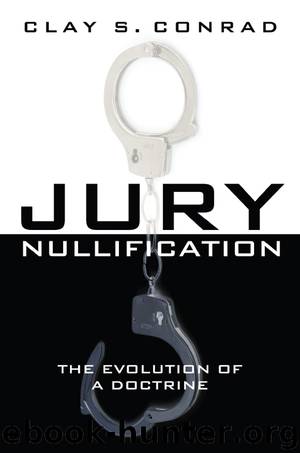Jury Nullification by Conrad Clay S

Author:Conrad, Clay S.
Language: eng
Format: epub
Tags: ebook, book
Publisher: Cato Institute
Published: 2013-09-27T16:00:00+00:00
Political Developments and Renewed Interest in Independent Juries
The inevitable response to unpopular laws is that juries, once informed of their powers, will at least occasionally refuse to enforce them. In the early days of this country, juries were selected from the elite white male property-owning classes, and were well aware of their powers before jury selection began. Further, judges regularly reminded jurors of their powers, so that a juror unaware that he could acquit if he thought the law unjust was quickly disabused. Because of the elite nature of early juries, jurors were selected from the same small class of citizens who wrote and enforced the laws. This helps explain the low rate of jury resistance in early American history, although where the laws were unfairly enforced or had been passed with a slim majority, jurors would still occasionally rebel.
Today, juries are supposed to represent a random cross section of the community in which the case is tried. The federal jury selection statutes demand as much:
It is the policy of the United States that all litigants in Federal courts entitled to trial by jury shall have the right to grand and petit juries selected at random from a fair cross section of the community in the district or division wherein the trial convenes. It is further the policy of the United States that all citizens shall have the opportunity to be considered for service on grand and petit juries in the district courts of the United States, and shall have an obligation to serve as jurors when summoned for that purpose.40
Such a cross section can and should include all classes, genders, ethnic groups, and occupations. These jurors do not necessarily have the same close connection with those who write or enforce the laws that early jurors had. Their sympathy for the law may be muted or absent, and their empathy with the defendant may be much greater than existed in the eighteenth century.
Probably less than 10 percent of these potential jurors can be expected, however, to be aware of their powers as jurors, or knowledgable enough to exercise them reliably sua sponte.41 We have seen, through Milgrams’ studies, that many modern Americans are terrifyingly willing to obey authority figures even when what they are being ordered to do goes against their most deeply held convictions.42 Charging jurors with unquestioningly applying the law, as laid down by the judge, strips them of the essential element of personal responsibility for the verdict they deliver. As a result, modern jurors may play their role as if the fate of the defendant were an abstract intellectual challenge, divorced from the flesh and blood life of a real human being. By not allowing their conscientious scruples to impact their verdict, they may deny the defendant his constitutionally guaranteed right to be judged by the conscience of the community, the judgment of his peers as envisioned by the framers of the Constitution.
Denying the power of jurors to judge the law also strips the law of legitimacy.
Download
This site does not store any files on its server. We only index and link to content provided by other sites. Please contact the content providers to delete copyright contents if any and email us, we'll remove relevant links or contents immediately.
Objection! by Nancy Grace(1778)
Apeirogon by Colum McCann(1701)
Anatomy of Injustice by Raymond Bonner(1664)
That Every Man Be Armed by Stephen P. Halbrook(1578)
Civil Procedure (Aspen Casebooks) by Stephen C. Yeazell(1554)
The Vaccine Court by Rohde Wayne(1508)
Injustices by Ian Millhiser(1497)
Storytelling for Lawyers by Meyer Philip(1461)
A Practical Guide to International Arbitration in London by Hilary Heilbron(1434)
Restitution by Restitution(1424)
Coercing Virtue by Robert H. Bork(1357)
Broken Scales by Joel Cohen(1352)
Tangled Webs: How False Statements Are Undermining America: From Martha Stewart to Bernie Madoff by James B. Stewart(1337)
The Tools of Argument: How the Best Lawyers Think, Argue, and Win by Joel Trachtman(1316)
A Matter of Interpretation by Antonin Scalia(1310)
INDEFENSIBLE: One Lawyer's Journey Into the Inferno of American Justice by Feige David(1291)
American Tragedy by Lawrence Schiller & James Willwerth(1273)
A Religious Orgy in Tennessee by H.L. Mencken(1250)
Tangled Webs by James B. Stewart(1245)
